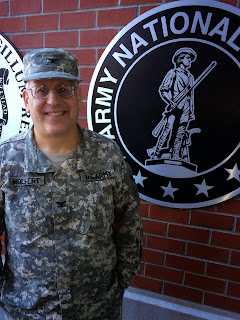 |
| Colonel Richard Wolfert, AKA The Toothboss |
Like a lot
of veterans, I don’t often talk about my experience in the military. Yet for
those who ask where did you come up with a name like “The Toothboss”, you have
heard the story about some of my military service. Specifically, the Commander
who gave everybody a title and if you were in charge of something, you were the
boss. If you ran the mess or cafeteria, you were the mess boss. I took care of
teeth, so I was the Toothboss.
What can I
say, the name stuck.
For this
Veteran’s Day, I thought I would share my story of military service.
I joined the military since 1981 and have served 32 years
total. I took a one-year sabbatical in 1988 when I made the transition from the
Active Navy and Reserves to the Army National Guard Reserve.
I guess the main reason I joined was I come from a military
family. My Dad was involved with making munitions at National Fireworks in
Hanover. My two older brothers are Vietnam vets (Marines and Army). Coming from
a patriotic family, I felt I should serve.
I think my most significant achievement (other than
coming home from Iraq in one piece, physically and mentally) was achieving
the rank of a full-bird Colonel about 15 years ago.
I suspected that was going to be my pinnacle and that I'd
get out when I got my "20 year letter". When I got to the 20-year
point, I realized that duty was somewhat easier at this rank and time in life.
With the kids being older (no more missed soccer games, etc. with weekend duty
and summer camp) and me enjoying the break it gave me from a solo private
practice, remaining in the service enabled me to continue the camaraderie, the
testosterone, and the general feeling that I was providing a service to our
soldiers with my special training. It gives me a good feeling.
I can't say the military has made me a better dentist, but
it certainly made me realize how important a pain-free mouth was for soldiers
to be better decision makers. You don't want the guy with his fingers on an
M-16 or a nuclear weapon having a toothache!
The military certainly gave me confidence in myself and in
my craft--enough to begin and maintain a private practice for 25 years. It's a
good training ground for learning to be a leader and a manager of people.
Although I have to admit, managing soldiers (mostly men) is a lot easier than
managing a bunch of woman in private practice!
When I go to Veterans Day services, I mostly think
about my brothers and those whom served in the Vietnam War. I came home to
a United States that was positive about what we were doing in Iraq. I
can't imagine what it must have been like for those poor guys getting off the
plane from their tour in Vietnam and being lambasted for missions that were not
so popular and a military that was not held in the highest esteem. When I came
off the plane we were met with people holding flags and handing out paid phone
cards so we could immediately call our loved ones. And when I got home the
Veteran Service Agent handed me a check for a thousand bucks for duty served.
I’m proud to be a veteran and proud of my family’s history
of service. I guess what I think about most on Veteran’s Day is how lucky we are
to live in a country where so many of its citizens have been willing and are
still willing to serve.